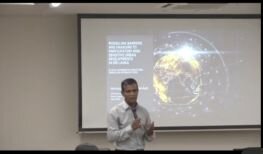Lecture by Assoc. Prof. Kaushal Keraminiyage - Modelling Barriers and Enablers to Participatory Risk-Sensitive Urban Developments in Sri Lanka
During his visit to lecture at the Intensive Courses offered by ILAS, Kyoto University Kyoto as a "Distinguished Visiting Professor", Dr. Kaushal Keraminiyage, Associate Professor, Centre for Disaster Resilience, School of Science Engineering and Environment, University of Salford, UK, took the opportunity to contribute a lecture to the GADRI Lecture Series. The lecture was delivered DPRI students and faculty members on 12 September 2023 .
Abstract:
Urban developments inherently contribute to increased disaster risks. Hence, it is important to adopt risk sensitive development strategies in helping global disaster risk reduction attempts. While communities play a significant role in recognising the local risk sensitivity, despite their lived experience in surviving local hazards, in most cases, local disaster risk mitigation and development plans seem to be developed predominantly through a top-down approach. This study, using Sri Lanka as a case study, investigated the barriers to effective community participation in the decision-making process of risk sensitive urban developments and thereby developed an interpretive logic model to establish an understanding of why they occur and how each barrier is interlinked. The study employed a Grounded Theory Methodology (GRM), followed by the Total Interpretive Structural Modelling (TISM) and Matrix Impact of Cross Multiplication Applied to Classification (MICMAC) analysis.
Brief Biography:
Dr Kaushal Keraminiyage is an Associate Professor (Reader) in disaster risk reduction and smart communities at the Centre for Disaster Resilience, School of Science Engineering and Environment at the University of Salford, UK. He is also currently a visiting professor at the Kyoto University, and an experienced researcher with a good publication profile and funded research projects. Having secured external and internal funding from funding bodies such as EPSRC, and EC, he has led a number of research projects as a principal investigator and a co-investigator.
Dr Keraminiyage has supervised and graduated a more than 15 doctoral students successfully and he is currently supervising PhD students in the broad research areas of Disaster Resilience and Construction Management. He has also examined (as the external or the internal examiner) more than 20 Doctoral theses. His specialism is in Disaster Induced Resettlements, Resettled and Host Community Integration, Community Resilience to Disasters, Agile Communities for Disaster Response and Sustainable and Resilient Urban Developments.







